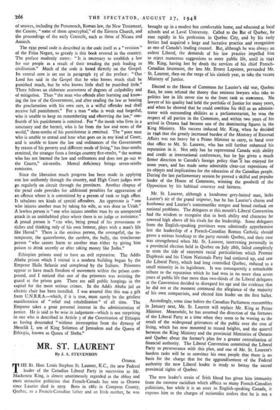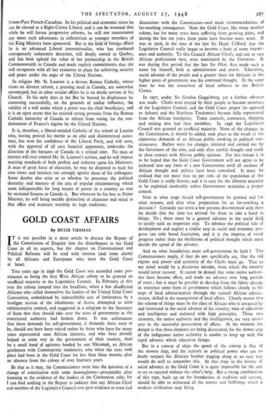MR. ST. LAURENT
By J. A. STEVENSON Ottawa.
T •
HE Rt. Hon. Louis Stephen St. Laurent, K.C., the new Federal leader of the Canadian Liberal Party in succession to Mr. Mackenzie King, is almost unanimously regarded as the ablest and most attractive politician that French-Canada has sent to Ottawa since Laurier died in 1919. Born in 1882 in Compton County, Quebec, to a French-Canadian father and an Irish mother, he was
brought up in a modest but comfortable home, and educated at local schools and at Laval University. Called to the Bar of Quebec, he rose rapidly in his profession in Quebec City, and by his early forties had acquired a large and lucrative practice and recognition as one of Canada's leading counsel. But, although he was always an ardent Liberal, the demands of his law practice impelled him to reject numerous suggestions to enter public life, until in 1941 Mr. King, having lost by death the services of his chief French- Canadian lieutenant, the late Mr. Ernest Lapointe, persuaded Mr. St. Laurent, then on the verge of his sixtieth year, to take the vacant Ministry of Justice.
Elected to the House of Commons for Laurier's old seat, Quebec East, he soon refuted the theory that eminent lawyers who take to politics late in life never rise to the front rank as statesmen. No lawyer of his quality had held the portfolio of Justice for many years, and when he showed that he could combine his skill as an adminis- trator with outstanding abilities as a parliamentarian, he won the respect of all parties in the Commons, and within two years of his arrival in Ottawa had become one of the dominating figures in the King Ministry. His success induced Mr. King, when he decided in 1946 that the greatly increased burden of the Ministry of External Affairs was too heavy for a Prime Minister to carry, to hand over that office to Mr. St. Laurent, who has still further enhanced his reputation in it. Not only has he represented Canada with ability and credit at international conferences, but he has given a much firmer direction to Canada's foreign policy thanli has enjoyed for some years, and has made some admirable clear-cut expositions of its objects and implications for the education of the Canadian people. During the last parliamentary session he proved a skilful and popular leader of the House of Commons, winning the goodwill of the Opposition by his habitual courtesy and fairness.
Mr. St. Laurent, although a handsome grey-haired man, lacks Laurier's air of the grand seigneur, but he has Laurier's charm and bonhomie and Laurier's statesmanlike temper and broad Outlook on national problems. The delegates at this month's Liberal Convention had the wisdom to recognise that in both ability and character he towered high above all his rivals for the leadership. Sorneslelegates from the English-speaking provinces were admittedly apprehensive lest the leadership of a French-Canadian Roman Catholic should prove a serious handicap to the party outside Quebec, and their case was strengthened when Mr. St. Laurent, intervening personally in a provincial election held in Quebec on July 28th, failed completely to stem the tide of extremist racial particularism which Premier Duplessis and his Union Nationale- Party had conjured up, and saw the Liberal Party, which had long controlled Quebec, reduced to a small minority in its legislature. It was consequently a remarkable tribute to the reputation which he had won in no more than seven years of public life that more than two-thirds of the Liberal delegates at the Convention decided to disregard his age and the evidence that he did not at the moment command the allegiance of the majority of his own compatriots, and elected him leader on the first ballot.
Accordingly, some time before the Canadian Parliament reassembles in January next, Mr. St. Laurent will replace Mr. King as Prime Minister. Meanwhile, he has assumed the direction of the fortunes of the Liberal Party at a time when they seem to be waning as the result of the widespread grievances of the public over the cost of living, which has now mounted to record heights, and the quarrel between the King Ministry and the provincial Ministries of Ontario and Quebec about the former's plan for a greater centralisation of financial authority. The Liberal Convention committed the Liberal Party to perseverance with this plan, and one of Mr. St. Laurent's hardest tasks will be to convince his own people that there is no basis for the charge that for the aggrandisement of the Federal authority the new Liberal leader is ready to betray the sacred provincial rights of Quebec.
The new leader's strain of Irish blood has given him immunity from the extreme racialism which afflicts so many French-Canadian politicians, but while it is an asset in English-speaking Canada, it exposes him to the charges of nationalist zealots that he is not a
Simon-Pure French-Canadian. In his political and economic views he can be classed as a Right-Centre Liberal, and it can be assumed that while he will favour progressive reforms, he will not countenance any more such adventures in collectivism as younger members of the King Ministry have sponsored. But in the field of foreign affairs he is an advanced Liberal internationalist, who has combated courageously isolationist doctrines, still deeply rooted in Quebec, and has both upheld the value of her partnership in the British Commonwealth to Canada and made explicit commitments that she will co-operate with all her resources in plans for achieving security and peace under the aegis of the United Nations.
In religion Mr. St. Laurent is a devout Roman Catholic, whose views on divorce reform, a pressing need in Canada, are somewhat stereotyped, but in other secular affairs he is no docile servant of his Church. In his early days at the Bar he braved its displeasure by contesting successfully, on the grounds of undue influence, the validity of a will under which a priest was the chief beneficiary, and it is an open secret that he resisted strong pressure from the Roman Catholic hierarchy of Canada to refrain from voting for the con- demnation of Franco's regime by the United Nations.
It is, therefore, a liberal-minded Catholic of the school of Laurier who, having proved his mettle as an able and disinterested states- man, has won the confidence of the Liberal Party, and will soon, with the approval of all save fanatical opponents, undertake the direction of the fortunes of Canada in a critical time. No man or interest will ever control Mr. St. Laurent's actions, and he will impose exacting standards of both probity and industry upon his Ministers. A man of great force of character, he may be disposed to back his own views and instincts too strongly against those of his colleagues. Some doubts also arise as to whether he possesses the political dexterity and mastery of the arts. of popular electioneering which seem, indispensable for long tenure of power in a country so rent by sectional fissures as Canada is. But whatever be his fate as Prime Minister, he will bring notable distinction of character and mind to that office and maintain worthily its high traditions.



































 Previous page
Previous page